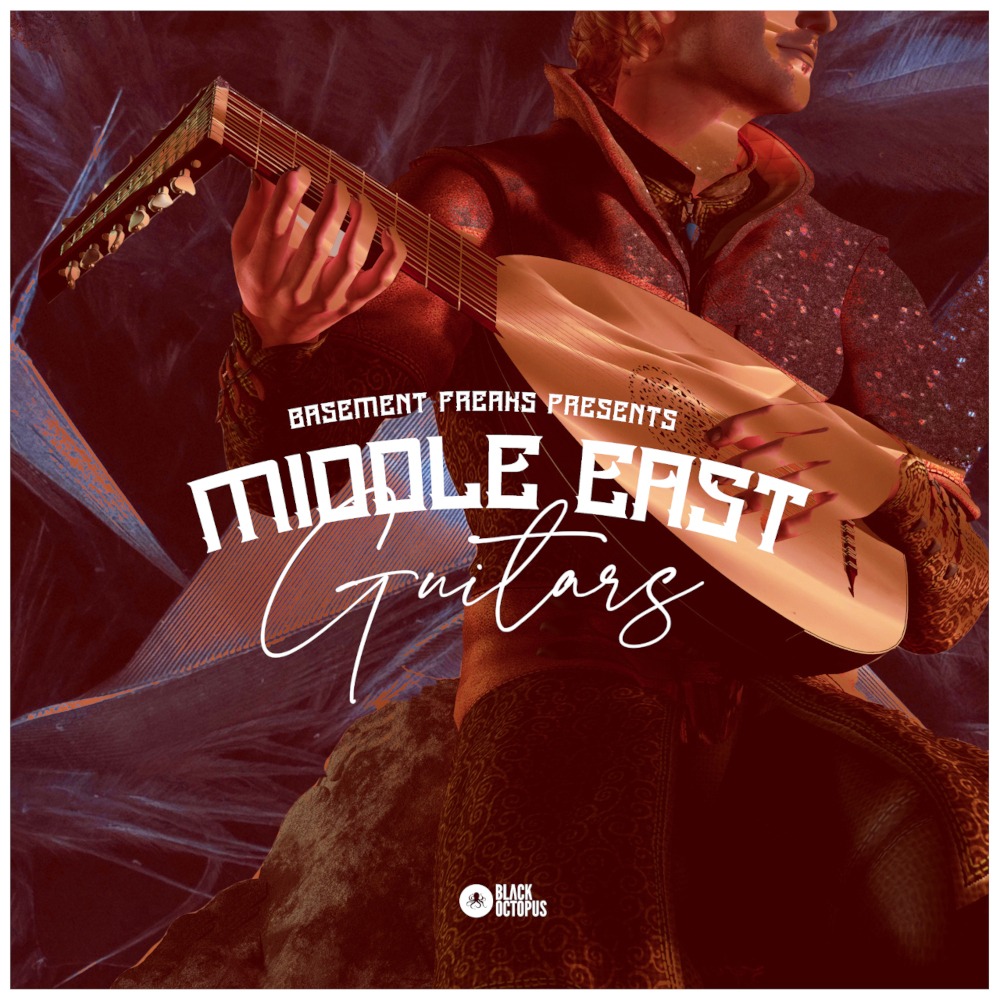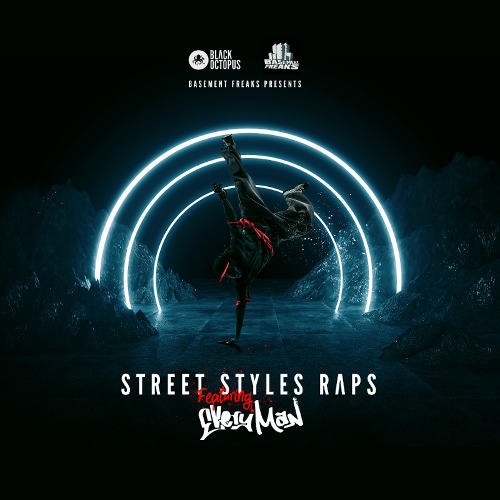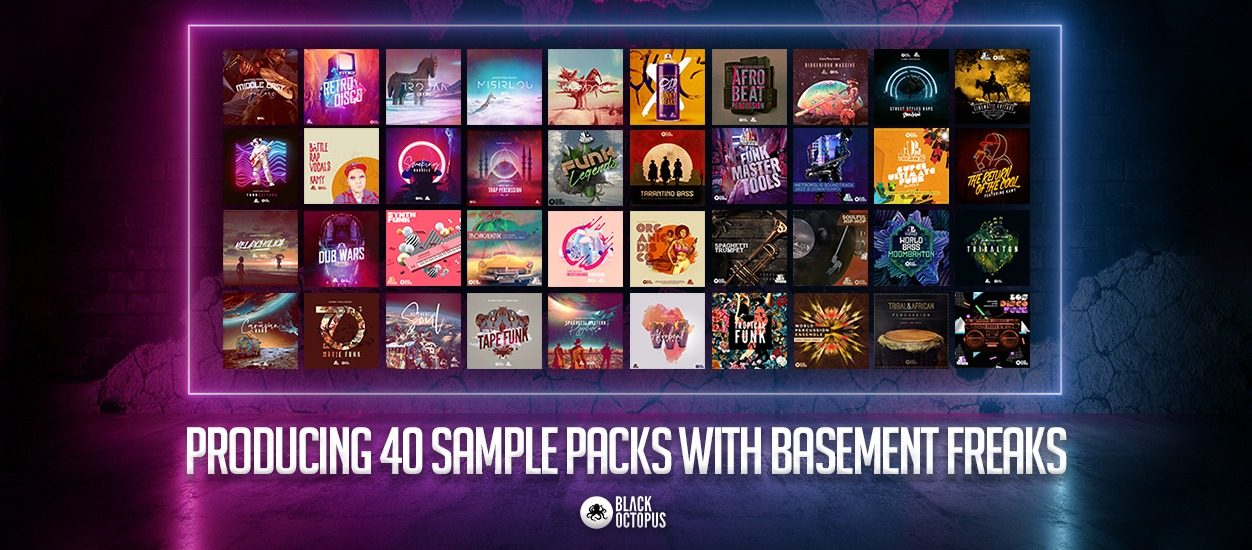 Anybody that has produced a sample pack knows how much hard work and dedication it takes to end up with a completed product. Not only do you have to posses a high level of sound design and musical skills, but there is also a large amount of work that goes on behind the scenes such as editing, organizing, and naming hundreds if not thousands of files. We launched the first Basement Freaks pack in 2014 and what a journey it has been to the very impressive 40th release in the catalog Middle East Guitars. We caught up with Basement Freaks producers Georgios Fotiadas to share some of his wisdom on what it takes to produce 40 sample packs and some insights into his studio tools and process.
Anybody that has produced a sample pack knows how much hard work and dedication it takes to end up with a completed product. Not only do you have to posses a high level of sound design and musical skills, but there is also a large amount of work that goes on behind the scenes such as editing, organizing, and naming hundreds if not thousands of files. We launched the first Basement Freaks pack in 2014 and what a journey it has been to the very impressive 40th release in the catalog Middle East Guitars. We caught up with Basement Freaks producers Georgios Fotiadas to share some of his wisdom on what it takes to produce 40 sample packs and some insights into his studio tools and process.
1) Congratulations on completing your 40th sample pack, that is definitely no small feat. Can you tell us what kind of determination and dedication it takes to complete 40 sample packs?
Thanks, its been 3 years of 100 % basement freakin, no much social media, no gigs or other type of activities except learning, testing, nerding out and questioning.
2) Do you have any advice for producers who want to start making sample packs?
As general advice I would point out that it is a totally different game than making music, there are very few people with amazing talent that can thrive on both ends. I was able to multi task a lot when I was younger because of my many interests for everything related with music but not so much anymore. My story here is total determination on one major goal. If you want to do this on full effect it will definitely be a crossover point on your producing career. Test it out and if its something for you then dive in. The competition levels are rising every day.
3) What are you some of your favorite tools in the studio?
My UAD Plugins and also my hardware: MPC ONE, Moog Sub Phatty, Analogue Heat, Digitone, Integra 7, Deepmind12, AKAI S-2000 & Emu Proteus 2500, Fender Guitars, SPL & Midas Pre amps, Warm Audio WA76 compressors, TC Electronics M-2000 effects processor, Chandler TDR-101 Tube Driver, AKG & Sennheiser mics, all favorites.
4) Where do you find your inspiration and ideas for some of your sounds?
I’ve been a session musician with the ability to jam hard, and then a music producer and a DJ. I’ve always been interested in every single music genre for over 3 decades. Inspiration comes from past band shows, DJ Shows, traveling, listening to records, listening even more records and lately checking my DJ friends Twitch shows. Of course I don’t forget to check the shops where my releases are placed and also to check and buy other sample packs. I am using Splice to the max, I have made dozens of tracks as an exercise with using only sounds from there.
6) You collaborate with a lot of different artists as well on some of your packs, what is it like collaborating on a sample pack with another artists versus working on your own? Are their advantages & disadvantages here?
 I was looking at expanding my sample pack collection in every possible way. Vocals, Percussions, and a few other things I couldn’t produce on my own. I’ve ended up having the pleasure to work with some amazing people and learn a lot of new things. Everyman from LA came over for few days and we recorded and produced our pack Street Styles Raps and that was a nice project.
I was looking at expanding my sample pack collection in every possible way. Vocals, Percussions, and a few other things I couldn’t produce on my own. I’ve ended up having the pleasure to work with some amazing people and learn a lot of new things. Everyman from LA came over for few days and we recorded and produced our pack Street Styles Raps and that was a nice project.
7) What is your process like for when you create a sample pack – do you have an idea or theme in mind to begin with or do you experiment with ideas and see how it takes shape?
I have tried, and will keep on trying all possible ways or combinations I can think of. I always have an idea but the same time I am flexible to move to the most suitable direction, I’d rather pick just a select few inspired recordings instead of tons of casual performances so I will jam and I will also delete a lot of what I won’t use. From here I can break down 2 major workflow examples to start with even though I generally think that its very difficult to give any type of advice on this subject to anyone without knowing his or her capabilities. Everything depends on what you know and can do. Everyone can be called to find out your new workflow totally by yourself, that’s what I did and I did it because I find it fascinating and interesting. Here are some examples:
- Recording a pool of loops and one shots from an instrument and then produce pieces of music over top of it is one way. Let the vibe of the recordings to guide you.
- Compose 10 different music patterns of a single genre to try cover most of its basic aspects, make a mix of those kits and export all the individual sounds. You can always add more sounds once you know already what you have.
In both cases you should have an idea to start with and know what you doing or messing with. If you are a beginner it’s possible you’ll have to go through several mistakes that you will have to learn & adjust.
It’s absolutely fine to experiment and try whatever it comes on your mind and also immediately capture that on tape. Since you’ll be dealing with hundreds of sounds you should always have a vision of the possibilities and directions that your experimentation have opened, do whatever you feel but in the end you should present a product that meets the industry standards.
8) You are quite a talented live musician in addition to being a producer – what skills does being a musician help in the sample pack world?
Thanks, being a musician has given me the advantage of recording and producing material for my own packs but also having an idea of how I can create the best conditions to record other musicians and take out as much as possible from the sessions.
I have to admit that DJing was a great school which I find very beneficial for my sample pack production, I was obligated to listen to even more music, collect even more music, and always stay updated on things. As a DJ I’ve learned about what moves the people. I am using all the information and experience I gathered from my past music career for this.
9) Can you tell us a little bit about your Basement Freaks music project? Do you prefer writing music to creating sample packs or do you enjoy them both the same?
I have moved from music production to sample packs production the last 3 years. I really wanted to dive in deep on making sample packs like I did. From this point and onward I might be able to keep all engines on and produce music, more packs, and anything else I enjoy doing. I’ve got into equipment nerding a lot for a while, it’s fun when you are able to test out stuff.
I’ve definitely have leveled things up on my arsenal thanks to Black Octopus Sound who has been exceptional on pushing my content on the right people and definitely played a huge role on this great achievement.
10) What do we have to look forward to in the future from you?
There might be a random day that I will start producing music and claim it as its my own again, the day that I will give up everything and ride with the mothership.
Will slice up Funk, tunes, samples, instrumentals, beats and anything that keeps my interests high.
End of Interview
A huge thanks goes out to Georgios for all his hard work he puts into his packs for us. Check out the Basement Freaks impressive catalog of sample pack HERE.
